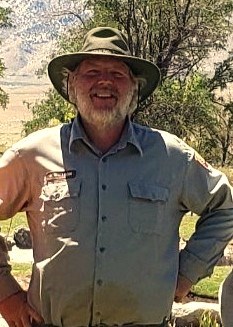Last updated: December 7, 2023
Article
2023 John L. Cotter Award for Excellence in NPS Archeology
The National Park Service is pleased to announce the winners of the 2023 John L. Cotter Award for Excellence in NPS Archeology. This award is presented to individuals and teams who demonstrate innovation in archeological practice, resource stewardship, and public outreach, among other criteria. We celebrate the kind of work we wish to see throughout the National Park system. This year’s winners are:

Marian Creveling (Professional Achievement)
Marian Creveling dedicated her career to the National Capital Regional (NCR) Archeology Program (RAP) and Museum Resources Center (MRCE). During her 30-year career, she amassed a tremendous body of professional accomplishments, from museum management and disaster response to archeological projects and public education.
Creveling recognized that NCR archeological collections were under-utilized due to poor collections management practices that hindered research and analysis. Making herculean efforts, she worked through backlogged collections to improve the cataloging and associated documentation. Her actions ensured that scientific archeological principles were upheld and that artifacts, field notes, analyses, and reports are available for future research. Creveling also played major roles in response to natural disasters affecting museum collections, including those at Ellis Island and at Jamestown.
Almost every archeological project carried out in NCR benefited from her attention, from organizing museum care to participating in the excavations and field collection. Among her most notable projects, she co-led a project with Barbara Little to conduct remote sensing at Antietam National Battlefield.
Creveling spearheaded RAP's participation in public archeology events for almost three decades. She gave countless tours of the RAP Archeology Lab, designed archeological activities and archeology-themed games for thousands of children and their families, and authored numerous short articles for public distribution, research papers for the public and professional communities alike, and made presentations at professional conferences.

Jeffery Franz Burton (Professional Achievement)
Jeffery Burton’s career has spanned private consulting, academia, and government service, including work for the USFS, NPS’s Western Archeological and Conservation Center and Manzanar National Historic Site. Throughout his career, Jeffery has worked with experts from various disciplines, federal, state, and local agency colleagues, international partners, non-profit groups, students, and volunteers to add to the understanding gained from archeological research.Burton’s work at sites related to Japanese American internment has garnered him awards from the Society for American Archaeology, the Japanese American Citizen’s League, and the National Park Service, including the Appleman-Judd Award and a past John L. Cotter Award for the first comprehensive archeological review of Japanese American Internment. The resulting report, titled “Confinement and Ethnicity: An Overview of World War II Japanese-American Relocation Sites,” compiles internee interviews, historical research, and structural, artifactual, and feature documentation, and resulted in new recognition for Japanese American draft resisters.
Since that time, Burton’s dedication to telling the difficult and shameful story of Japanese American incarceration in the mid-20th century has continued. He has advocated for, and conducted, projects at sites that manifest this admitted violation of American citizens’ civil rights, including at Minidoka National Historic Site and Honouliuli National Historic Site. His seven successful nominations to the National Register include the Tule Lake Segregation Center NHL, and Honouliuli Internment and POW Camp.
In 2007, he started Manzanar’s Community Archeology Program, an award-winning group that has uncovered and restored significant cultural landscape features in the park. Burton has excavated and restored gardens constructed by incarcerees. He has shared his work through publications, presentations, and public outreach events, so that the experiences of incarcerees and their descendants are properly recognized and that lessons of this dark episode of American history will not be forgotten.

Jeffrey Shanks and Andrew McFeaters (Project Achievement)
Survey, Community, and Interpretation at Prospect Bluff NHL, Florida – The “Negro Fort”
Through a partnership with USFS, Shanks and McFeaters conducted geophysical survey of the Prospect Bluff NHL, the site of a War of 1812-era British Fort in Florida, the home of one of the largest free communities of African-descended people in North America – known colloquially as "Negro Fort."The project grew from Section 106 compliance after a hurricane into a broader effort to ensure that the story of the people who lived there, fighting for their freedom in the shadow of enslavement, was told from the perspective of that Maroon community.
The geophysical results identified modifications of the British fort by the Maroons and the possible location of the village area, for the first time illuminating the Maroon community. The NPS VIP program brought descendants, including descendants of people who fled to Trinidad after the fort was destroyed in 1816, to the site. Working with partners, Shanks and McFeaters created a robust new effort to interpret this neglected site, based on the results of the project and through including the voices of the descendants whose story has thus far gone untold.
